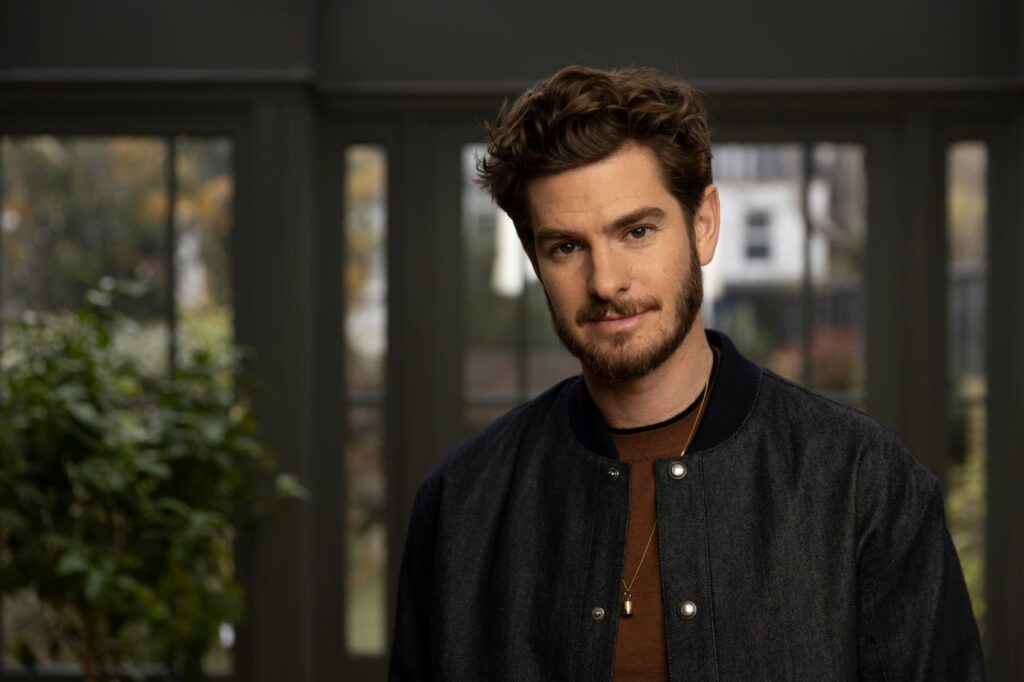Andrew Garfield is the first celebrity to explore their past in the brand new series of Who Do You Think You Are? starting 22 April.
Hollywood actor Andrew Garfield, who grew up between London and Los Angeles, knows that his father’s side of the family is Jewish and originally from Poland—but the details have always been a mystery. To uncover more about his roots, Andrew embarks on a deeply personal journey with his father, Richard.Subscribed
They begin by looking through old family photographs of Andrew’s great-grandparents, Ludwig Garfinkel and Sara Kupczyk. Richard explains that Ludwig changed his surname to Garfield when he moved to the UK around 1909. Meanwhile, Sara’s family emigrated to the United States, where their name was anglicised to Cooper. Among the photos are intriguing images: one of Ludwig with two young women who might be his sisters, and another of a mysterious woman on a postcard written in Yiddish. Richard believes the family originated from Kielce, Poland.
Andrew travels to Kielce, where genealogist Matan Shefi has traced his Polish family tree. Ludwig’s parents were Szmul and Chaja, and while Szmul died in 1904, Chaja was left to raise their seven children. Ludwig had five sisters and one brother, who sadly died in childhood. When Ludwig left for London in 1910, he left behind his mother and five surviving sisters. Matan translates the postcard and reveals it was sent by one of Ludwig’s sisters, Basia, who was living in Warsaw at the time.
Curious about why his great-grandfather would leave his family behind, Andrew meets historian Katarzyna Person at the former synagogue in Kielce. She explains that, in the early 20th century, Poland—especially towns like Kielce—was rocked by pogroms, with Jewish communities facing violence and destruction. Many businesses were ruined and thousands of Jews were killed. It was during this time of fear and uncertainty that Ludwig decided to seek a better life in London for his wife and young child.
Katarzyna takes Andrew to the street where Ludwig’s mother and sisters lived. A 1930 register shows that Chaja and two of her daughters were working as seamstresses. Meanwhile, the postcard proves that Basia was living in Warsaw, and another sister, Ruchla, had emigrated to Brazil, where she married into the well-known Szpilman family. Her husband’s cousin was the famed pianist whose story was immortalized in the film The Pianist. Records also show that one of Ludwig’s sisters died in 1935.
After Germany invaded Poland in 1939, the Jewish population was subjected to persecution. A ghetto was established in Kielce in 1941. If Ludwig’s family remained in Poland at that time, this is likely where they would have been forced to live. However, there are no existing records to confirm what happened to Chaja or her daughters Szajndla, Dworja, and Basia during the Holocaust.
In a moving twist, the genealogical team traces Ruchla’s son, who now lives in Florida with his daughter. On a Zoom call, they share a poignant family truth: Chaja managed to escape Poland in 1936 and joined Ruchla in Brazil. Sadly, two of her other daughters tried to follow but were unable to obtain visas. During the war, all correspondence from them ceased, and the family believes they were killed in the Holocaust. Andrew now understands the likely fate of the three sisters who were left behind. He visits the memorial at Treblinka, where many Jews from the Kielce and Warsaw ghettos were murdered, and lays a stone in remembrance.
Andrew then turns to the American side of his family—his great-grandmother Sara’s relatives, the Coopers. At the Wilshire Boulevard Temple in Los Angeles, he meets historian Caroline Luce, who shows him documents revealing that Sara’s brother Harry was the first to arrive in the U.S., immigrating in 1919. Once in LA, he opened a women’s clothing store, and over time, other members of the family followed. A 1930 census record includes a familiar name—Bernard Taper, Andrew’s grandfather’s cousin.
Andrew visits his Cooper relatives in LA, who recall the elegance of the family’s fashion store and share that Bernard was a respected journalist and a significant figure in the arts. At the Getty Museum, Andrew meets art historian Anna Bottinelli, who reveals an astonishing fact: Bernard was one of the Monuments Men, a group tasked with recovering art looted by the Nazis after WWII.
Watch the episode Tuesday 22 April, 9pm on BBC One and BBC iPlayer.
Read Next…
The Version: Entertainment News, Lifestyle & Travel


